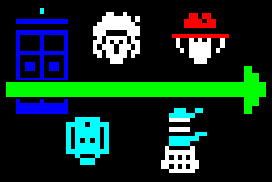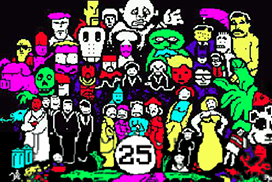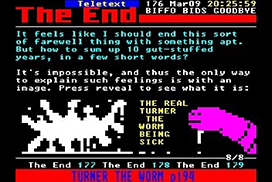
Grumble feature enabled

|
Loss of innocence
Edge #179, September 2007
Although I'm not exactly an old man just yet, the age they call middle isn't all that far away. Having spent my 20s thinking I was in my 50s, and my early 30s behaving like a 17-year-old, I feel like I've finally achieved a nice balance; I'm 36 this year, and at last I feel my age.
Looking back, I have been playing videogames for nigh-on 28 years, or thereabouts. I started at the tail end of the Atari VCS era, and continued playing via a ZX Spectrum, Atari ST, Master System, Game Boy, and pretty much every system that has been released from that point onwards.
On occasion, being a gamer has felt a bit like that sequence in The Time Machine, where the guy is strapped into his seat, and watches the dress shop window opposite his house.
You know the bit I mean - fashions cycle through a kaleidoscope of colours and hemlines lengths, then London gets bombed, and rebuilt, before the time traveller becomes walled inside a volcano, and gets the runs really badly. Except: for this metaphor to work he'd have to be sat outside a branch of Game. And he wouldn't need to be strapped into a time machine for the window display to blur past in the blink of an eye; he could just stand in front of it, and watch things change in realtime.
Compare the games market of today to the one of 20 years ago, and it's unrecognisable. Compare it to the one of five years ago, and it's still pretty much unrecognisable. Technology moves at a lung-crumpling speed, and while developers can create whole worlds - with flowing water, and swaying trees, and people with glinty, twinkly eyes - and cram them on to a DVD, there's one thing they will never be able to synthesise. And that thing is this thing: nostalgia.
One of the saddest aspects of growing old as a gamer is that the games lose a certain degree of mystique. When I was younger it felt as if games were a window on to elsewhere, that they'd been punted into our universe from some other dimension. The people behind them were alchemists - weird geniuses with their brains wired into some elemental, unexplainable form of inspiration. Of course, thanks to the retrogaming boom of the last few years we all now know that Matthew Smith and The Oliver Twins et al weren't sorcerers at all - just computer boffin-y blokes who had watched far too much Monty Python.
I suppose this is just a consequence of getting older, and I suppose it happens to a similar degree with music or films. My appetite for music is voracious, and I've recently come to realise that I've been chasing a high that I'll never find again, short of losing the last 20-odd years of my memories. Our taste in music tends to get locked in around the age of 14, and I'd argue that it's the same with games. When I think about the games which really define me and my tastes, they're the ones I played in my early teens.
That's not to say I spent the subsequent two decades finding games lacking. Far from it, in fact - in many respects, games are better than ever. Nevertheless, there hasn't been a game released since about 1985 that has made the hairs stand up on the back of my parts.
Take the Zelda series, for example. I've realised that - as the series progresses - I've actually found each subsequent game less immersive than the one that preceded it. I may not have been there at the very start of the franchise, but had I played those very early Zelda games, I have no doubt that they'd have blown my mind. With Twilight Princess I feel like I'm playing a game, whereas with A Link To The Past I felt like I'd been transported somewhere. Conversely, if I was a 13-year-old playing Twilight Princess for the first time I dare say my point of view would be very different to the baggage-obscured one I brought to it as a 35-year-old.
It's as if, as I've grown older, I can glimpse the wizards behind the curtains. I'm less inclined to buy the illusion that the game makers are selling. I guess that we, as a species, begin with a surplus of imagination that gets depleted as we age, and get weighed down by the detritus of life.
It's like looking out of a plane window at night, as you're coming into land. From up there the lights look like diamonds, the streets dark and mysterious, hiding adventure and secrets. And then you land, and you can see that they're the same cracked and graffiti-scarred streets they always were; there's no romance, just ordinary lives, populated by ordinary, miserable people trying to pay their bills.
I dunno. I'm not sure I can even put my finger on what it is that I find missing in today's games. Who knows? Maybe it isn't all nostalgia; maybe even today's web-savvy teens are clued up on the fact that games exist to make money for the people who make them.
Maybe it wasn't just me who was more innocent back when I first started playing games - maybe it was the industry itself.
Mr Biffo co-founded Digitiser, Channel 4's Teletext-based videogames section, and now writes mainly for television
Do you know of any important moments from the annals of Digi history that have been omitted? If so, then mail me (superpage58@gmail.com) right now, man. Credit will be duly given for anything that gets put up.









